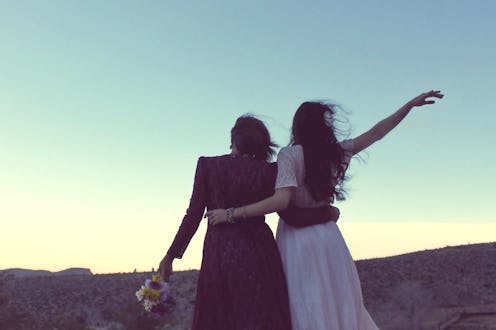Life
How Weddings Have Changed In The Last Year

I hope I never forget the day last June when, after a landmark Supreme Court ruling, gay marriage became legal throughout the U.S. A combination of joy, relief, and celebration flooded my Facebook and Twitter feeds. My friends (a significant portion of whom identify as LGBTQ) were over the moon that they'd been given the legal ability to marry whomever they wanted. Despite all the other issues in the news that day, and all the other rights the LGBTQ community still struggled to attain, I couldn't help thinking that June 26, 2015 confirmed what so many of us already knew: love is love. But how have same-sex weddings changed in the last year? WeddingWire and GayWeddings surveyed both straight and gay couples who married in the past year to see what trends have cropped up since last June's decision.
There are so many steps that go into planning a wedding that are often rooted in tradition: choosing a venue, making a guest list, deciding on a budget, inviting a religious official (if any) to participate, and finding a dress. And as WeddingWire points out, all of these steps shift a little (or a lot) when the couple is LGBTQ. How to cover the cost of two dresses if both members of the couple are brides? If there are two grooms, whose family pays for what? And what if one groom's family is 100 percent down with gay marriage, but the other's family still hasn't come around to the idea? How do you navigate that guest list?
It's exactly a year after the Obergefell v. Hodges ruling, and during that time, the wedding planning industry has shifted dramatically as LGBTQ couples around the nation have been able to marry without as much legal hassle as before. Here are some of the survey's results:
1. More couples get married in their home state
Because gay marriage is now legal in every state, couples don't have to travel just to legalize their union. According to the survey, 77 percent of LGBTQ couples got married in their home state this past year.
2. Traditional ceremonies and receptions are more common
The average amount of money same-sex couples spend on their weddings is up 88 percent from 2013, the survey found, largely because fewer couples are opting for simpler "city hall" weddings. In the last year, 79 percent of couples say that they do go in for the works, choosing to have a ceremony and reception.
This is both promising and comforting, since the ceremony provides an opportunity for couples to declare their commitment in front of all their loved ones. The reception, of course, lets everyone throw down together.
3. Same-sex couples spend less overall, but more per guest
The average cost of a same-sex marriage this year was $11,000, compared to $15,000 for opposite-sex couples. This is probably because LGBTQ couples invite less people, but they do spend more on each guest who scores an invitation: $117, compared to $100.
4. More LGBTQ couples' parents are pitching in
In traditional weddings, the bride's parents foot most or all of the bill. Personally, I think this is a load of hooey — if parents are going to pitch in at all, it should be both sets — but this sometimes becomes even more complicated with same-sex couples. What if there are two brides? Who contributes, especially if neither set of parents is supportive? In the past, the most common answer has been that the same-sex couple pays for the lion's share of the wedding. Now, though, 26 percent of LGBTQ couples' parents are helping to pay for the wedding, whether that be "some or all" of the costs.
5. Same-sex couples' parents are more likely to approve
During the last year, 86 percent of opposite-sex couples said their parents provided emotional support during the marriage process. The number for same-sex couples is lower — 60 percent — but that's up from 46 percent in the past. Again, the change is probably due to the general increase in acceptance of LGBTQ unions.
So, if you're a same-sex couple and you're planning on tying the knot in the next few months, these facts and figures might be worth examining more closely. And even if you're not, WeddingWire is a great resource for wedding knowledge in any area. Happy (and peaceful) planning!
Images: BhaktiCreative, skeeze, Gadini/Pixabay; Sweet Ice Cream Photography/Unsplash